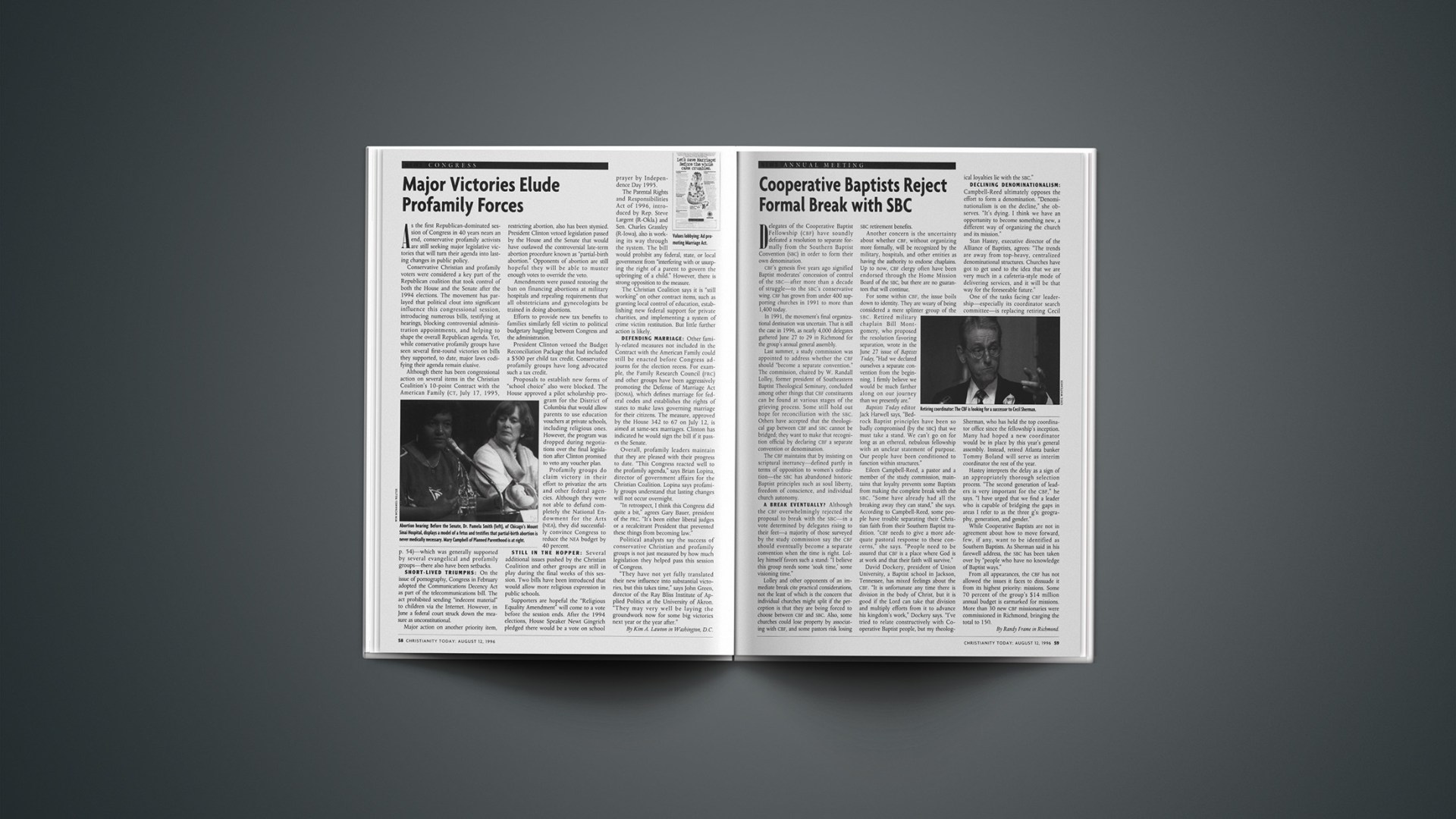CBF’s genesis five years ago signified Baptist moderates’ concession of control of the SBC–after more than a decade of struggle–to the SBC’s conservative wing. CBF has grown from under 400 supporting churches in 1991 to more than 1,400 today.
In 1991, the movement’s final organizational destination was uncertain. That is still the case in 1996, as nearly 4,000 delegates gathered June 27 to 29 in Richmond for the group’s annual general assembly.
Last summer, a study commission was appointed to address whether the CBF should “become a separate convention.” The commission, chaired by W. Randall Lolley, former president of Southeastern Baptist Theological Seminary, concluded among other things that CBF constituents can be found at various stages of the grieving process. Some still hold out hope for reconciliation with the SBC. Others have accepted that the theological gap between CBF and SBC cannot be bridged; they want to make that recognition official by declaring CBF a separate convention or denomination.
The CBF maintains that by insisting on scriptural inerrancy–defined partly in terms of opposition to women’s ordination–the SBC has abandoned historic Baptist principles such as soul liberty, freedom of conscience, and individual church autonomy.
A BREAK EVENTUALLY? Although the CBF overwhelmingly rejected the proposal to break with the SBC–in a vote determined by delegates rising to their feet–a majority of those surveyed by the study commission say the CBF should eventually become a separate convention when the time is right. Lolley himself favors such a stand: “I believe this group needs some ‘soak time,’ some visioning time.”
Lolley and other opponents of an immediate break cite practical considerations, not the least of which is the concern that individual churches might split if the perception is that they are being forced to choose between CBF and SBC. Also, some churches could lose property by associating with CBF, and some pastors risk losing SBC retirement benefits.
Another concern is the uncertainty about whether CBF, without organizing more formally, will be recognized by the military, hospitals, and other entities as having the authority to endorse chaplains. Up to now, CBF clergy often have been endorsed through the Home Mission Board of the SBC, but there are no guarantees that will continue.
For some within CBF, the issue boils down to identity. They are weary of being considered a mere splinter group of the SBC. Retired military chaplain Bill Montgomery, who proposed the resolution favoring separation, wrote in the June 27 issue of Baptists Today, “Had we declared ourselves a separate convention from the beginning, I firmly believe we would be much farther along on our journey than we presently are.”
Baptists Today editor Jack Harwell says, “Bedrock Baptist principles have been so badly compromised (by the SBC) that we must take a stand. We can’t go on for long as an ethereal, nebulous fellowship with an unclear statement of purpose. Our people have been conditioned to function within structures.”
Eileen Campbell-Reed, a pastor and a member of the study commission, maintains that loyalty prevents some Baptists from making the complete break with the SBC. “Some have already had all the breaking away they can stand,” she says. According to Campbell-Reed, some people have trouble separating their Christian faith from their Southern Baptist tradition. “CBF needs to give a more adequate pastoral response to these concerns,” she says. “People need to be assured that CBF is a place where God is at work and that their faith will survive.”
David Dockery, president of Union University, a Baptist school in Jackson, Tennessee, has mixed feelings about the CBF. “It is unfortunate any time there is division in the body of Christ, but it is good if the Lord can take that division and multiply efforts from it to advance his kingdom’s work,” Dockery says. “I’ve tried to relate constructively with Cooperative Baptist people, but my theological loyalties lie with the SBC.”
DECLINING DENOMINATIONALISM: Campbell-Reed ultimately opposes the effort to form a denomination. “Denominationalism is on the decline,” she observes. “It’s dying. I think we have an opportunity to become something new, a different way of organizing the church and its mission.”
Stan Hastey, executive director of the Alliance of Baptists, agrees: “The trends are away from top-heavy, centralized denominational structures. Churches have got to get used to the idea that we are very much in a cafeteria-style mode of delivering services, and it will be that way for the foreseeable future.”
One of the tasks facing CBF leadership–especially its coordinator search committee–is replacing retiring Cecil Sherman, who has held the top coordinator office since the fellowship’s inception. Many had hoped a new coordinator would be in place by this year’s general assembly. Instead, retired Atlanta banker Tommy Boland will serve as interim coordinator the rest of the year.
Hastey interprets the delay as a sign of an appropriately thorough selection process. “The second generation of leaders is very important for the CBF,” he says. “I have urged that we find a leader who is capable of bridging the gaps in areas I refer to as the three g’s: geography, generation, and gender.”
While Cooperative Baptists are not in agreement about how to move forward, few, if any, want to be identified as Southern Baptists. As Sherman said in his farewell address, the SBC has been taken over by “people who have no knowledge of Baptist ways.”
From all appearances, the CBF has not allowed the issues it faces to dissuade it from its highest priority: missions. Some 70 percent of the group’s $14 million annual budget is earmarked for missions. More than 30 new CBF missionaries were commissioned in Richmond, bringing the total to 150.
Copyright © 1996 Christianity Today. Click for reprint information.










